Blockchain Asset Value Calculator
Calculate Your Digital Asset Value
See how your blockchain assets could grow over time based on historical data from the article.
Results will appear here...
Based on article examples: In 2024, virtual land sold for $2.4M and Nike sneakers sold for over $1,000. NFT artists like 3Lau earn royalties from secondary sales.
Important Risk Warning: Blockchain assets can be volatile. As mentioned in the article: "If you forget your keys or lose your wallet, your assets are gone forever." Always keep your private keys secure.
When you buy a song on iTunes or a book on Kindle, do you really own it? Or are you just renting it? Most people don’t realize that in today’s digital world, digital ownership is mostly an illusion. You can’t resell that ebook. You can’t move your game skins to another platform. If the company shuts down, your entire collection vanishes. That’s not ownership. That’s a license with strings attached.
What Digital Ownership Actually Means
Digital ownership means you have full control over a digital asset - the right to use it, sell it, give it away, or modify it without asking anyone’s permission. It’s the same as owning a physical book: you can lend it to a friend, sell it at a garage sale, or keep it forever. In the digital world, that’s never been possible - until blockchain.
Blockchain changes that by creating a public, unchangeable record of who owns what. Think of it like a digital deed for your files, music, art, or game items. Once your ownership is recorded on the blockchain, no company, government, or hacker can take it away. You hold the keys. Not them.
How Blockchain Makes Ownership Real
Blockchain works by storing data across thousands of computers, not one central server. Every time something changes - like when you transfer an NFT or renew a domain - the network checks and confirms the transaction. No single person controls it. That’s called decentralization.
Each digital asset tied to the blockchain gets a unique identifier. It’s like a serial number that can’t be copied. Even if someone downloads your digital artwork, they don’t own it. Only the person with the blockchain record does. This is called provenance - a clear, tamper-proof history of who owned it and when.
Smart contracts make this automatic. These are tiny programs that run on the blockchain. They follow rules like: “If Alice sends 0.5 ETH to Bob, then the NFT transfers to her.” No middleman. No paperwork. Just code enforcing what was agreed upon.
What Can You Own on Blockchain?
You can own almost anything digital:
- NFTs - unique digital art, music, or collectibles. Each one is one-of-a-kind, like a signed print.
- Web3 domains - addresses like yourname.is or yourwallet.hodl. You own them forever unless you let them expire.
- Game items - weapons, skins, land in virtual worlds. You can sell them outside the game.
- Tokenized licenses - music rights, software access, or event tickets that can be resold.
- Digital files - photos, videos, documents - locked to your wallet and transferable.
Unlike before, where your game skins were locked in Steam or your music only played on Apple Music, blockchain lets you take your stuff anywhere. A digital guitar you bought in one game can be used in another - if the developers allow it. That’s interoperability. It’s like having a universal key for your digital life.
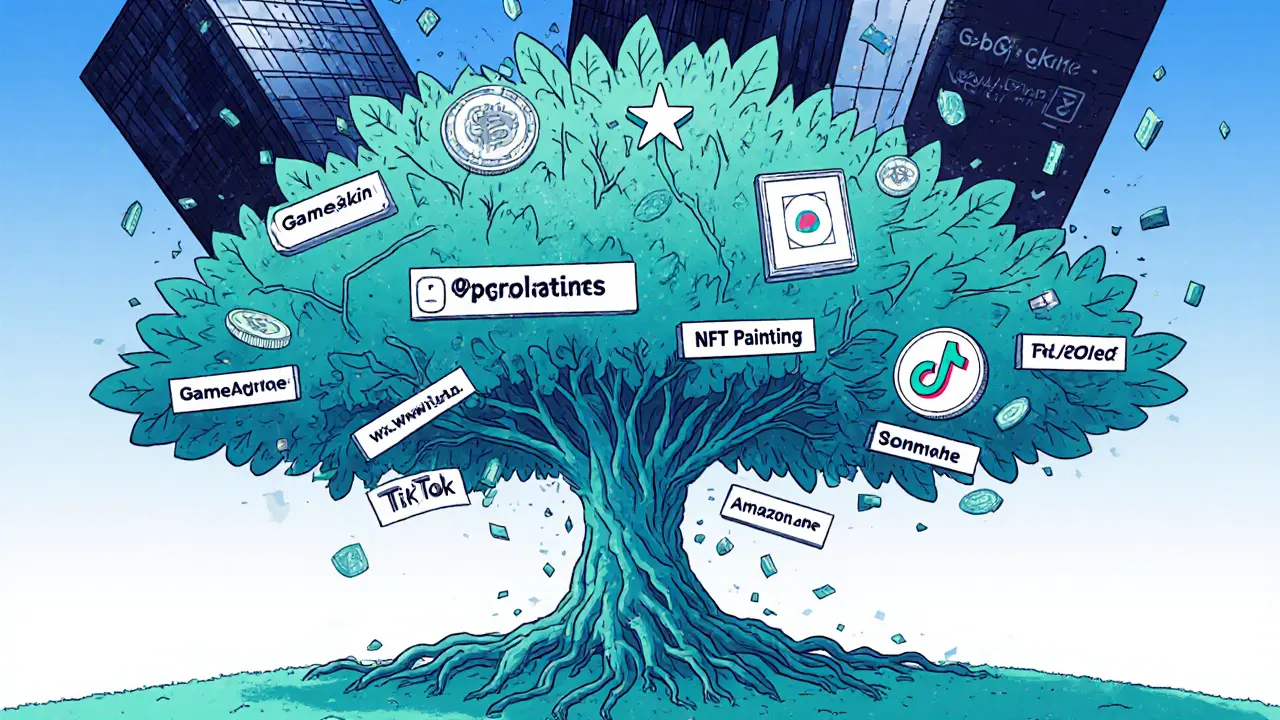
Real-World Examples: This Isn’t Theory Anymore
People are already using this. In 2024, a virtual plot of land in Decentraland sold for $2.4 million. A digital sneaker from Nike’s .SWOOSH collection resold for over $1,000. Musicians like 3Lau and Steve Aoki release albums as NFTs, giving fans ownership and a cut of future sales.
Even small businesses are jumping in. Boba Guys, a tea chain in California, replaced its loyalty card with a blockchain-based token. Customers earn tokens for purchases, which they can trade, gift, or use for discounts. No app. No tracking. Just direct ownership.
And it’s not just about money. Web3 domains let you log into websites without passwords. Your wallet becomes your identity. You control what data you share. No more Facebook spying on your browsing habits.
The Risks: Owning Digital Stuff Comes With Responsibility
Digital ownership sounds great - until you lose your keys.
If you forget your password, lose your hardware wallet, or click a fake link that drains your wallet, your assets are gone. Forever. There’s no “forgot password?” button on the blockchain. No customer support. You’re your own bank.
Some NFTs and domains expire. ENS domains (like yourname.eth) need yearly renewal in crypto. If you don’t pay, someone else can claim it. Smart contracts can have bugs. One glitch in 2022 erased $100 million in NFTs because a contract allowed unlimited transfers.
Even worse - some projects claim to be decentralized but still have a CEO who can freeze accounts. Always check: Is the contract truly open-source? Can anyone audit it? Is there a DAO or a single person in control?
Tools like Revoke.cash help. They show you which apps have access to your wallet. You can cut off permissions with one click. Don’t just connect your wallet to every site you see.
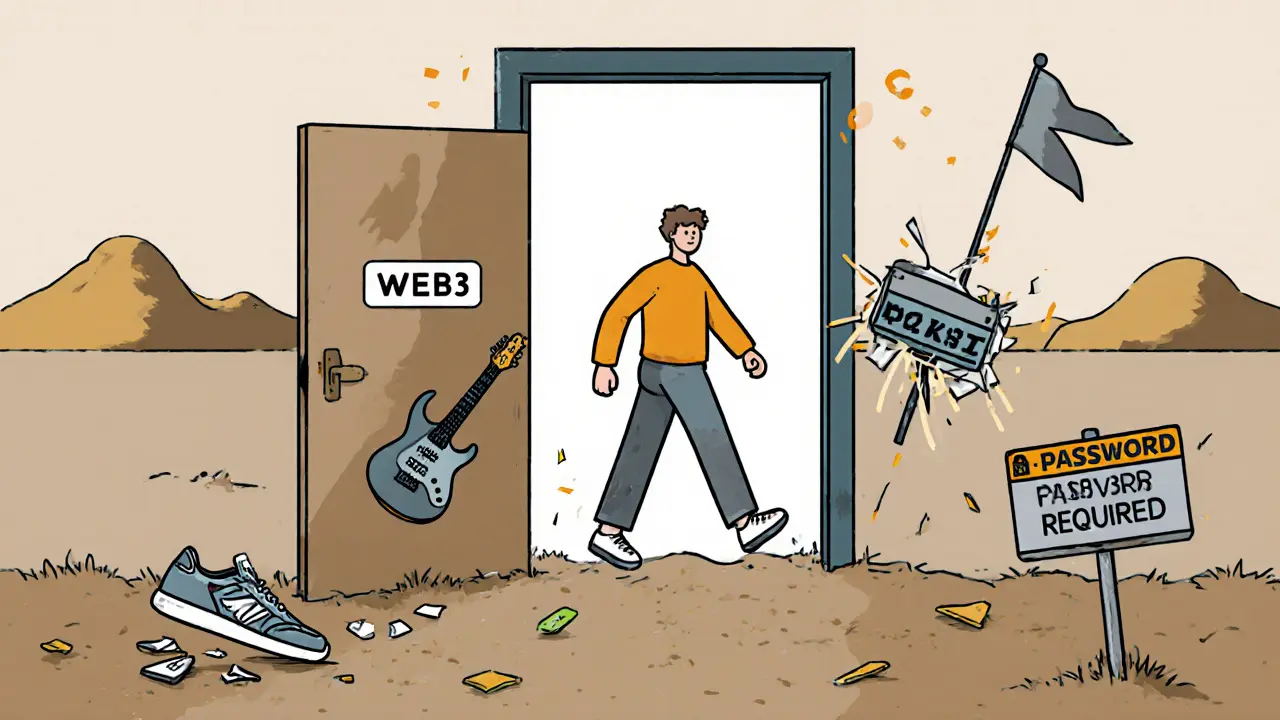
Why This Matters More Than You Think
This isn’t just about NFTs or crypto. It’s about power.
Right now, tech giants control your digital life. Google knows what you search. Amazon knows what you buy. TikTok knows what you watch. You don’t own your data - they monetize it.
Blockchain flips that. You become your own platform. You own your identity, your content, your money. Creators get paid directly. Fans get real value. No middlemen taking 70% of the profits.
It’s a shift from Web2 - where platforms own you - to Web3 - where you own yourself.
Companies that get this are already winning. The most profitable video games now make more money selling digital items than selling the game itself. Why? Because players care more about owning something they can trade than about playing a locked-down experience.
Where This Is Headed
Expect digital ownership to spread beyond art and games. Real estate deeds could be tokenized. Car titles. Medical records. College diplomas. Imagine proving your degree without asking your university for a transcript - just show your wallet.
Platforms like Polkadot and Ethereum are building tools so digital assets can move easily between apps. Soon, your NFT music could play in a VR concert, your game item could be used in a movie, and your domain could be your email, social profile, and payment address - all in one.
It’s not about replacing the internet. It’s about fixing its biggest flaw: we never truly owned anything in it.
Blockchain doesn’t just give you control over your digital stuff. It gives you back your rights as a person in the digital world.
Can I really own a digital file if anyone can download it?
Yes. Downloading a file is like photocopying a painting. You have a copy, but not the original. On blockchain, ownership is tied to a unique token - not the file itself. That token proves you’re the legal owner, even if the image is everywhere. It’s like owning the Mona Lisa while others have prints.
Do I need cryptocurrency to have digital ownership?
Mostly yes. Blockchain networks use crypto to pay for transactions and smart contract execution. You need ETH, SOL, or another native token to buy, transfer, or renew digital assets. But you don’t need to trade or speculate. You can hold your assets without ever touching crypto markets.
Are NFTs the only way to achieve digital ownership?
No. NFTs are the most common way right now, but they’re not the only one. Web3 domains, tokenized licenses, and even tokenized real estate use the same blockchain principles. Any digital asset can be owned if it’s recorded on a blockchain with a smart contract defining ownership rules.
What happens if the blockchain network shuts down?
Blockchain networks like Ethereum or Polkadot are designed to survive even if parts of the network fail. Thousands of computers hold copies of the ledger. As long as a few nodes remain, the data stays accessible. The biggest risk isn’t the network failing - it’s losing your private keys or the asset becoming obsolete.
Can I sell my blockchain-owned asset for real money?
Yes. That’s one of the biggest advantages. You can sell your NFT, domain, or game item on open marketplaces like OpenSea, Blur, or LooksRare. Buyers pay in crypto, which you can convert to cash through exchanges. Some people now earn full-time income from trading digital collectibles.
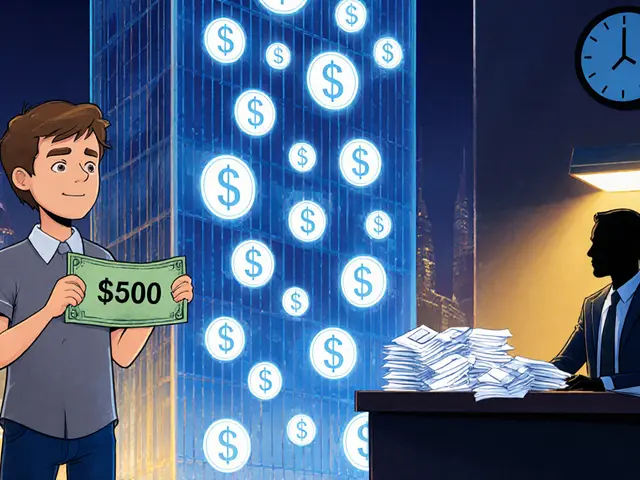
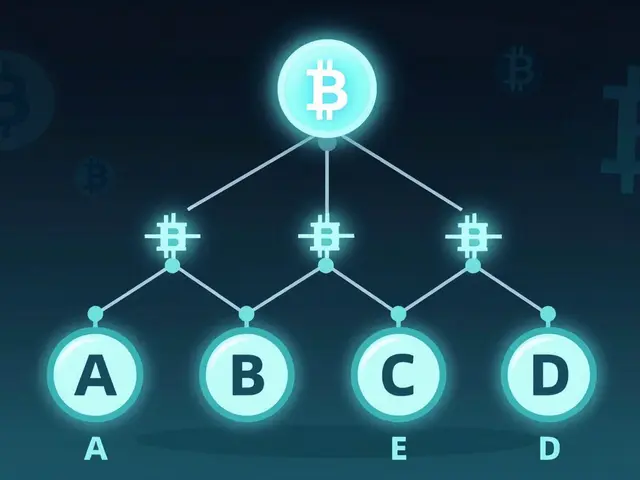
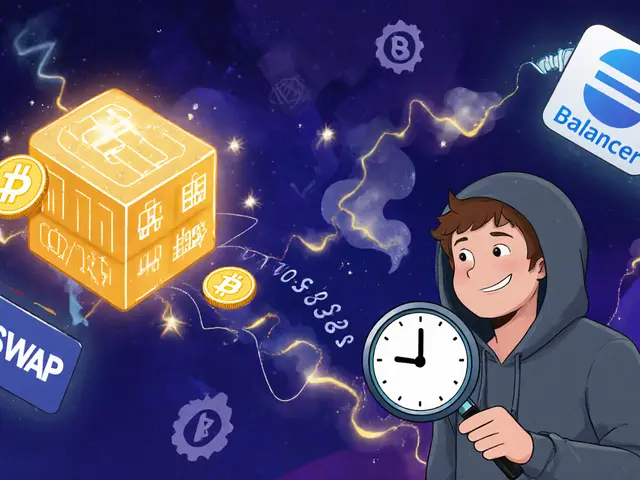
Marcia Birgen
This is the future, and I’m here for it 🎉✨
Imagine being able to sell your favorite game skin to a friend across the world without Steam taking 30%? YES PLEASE.
I bought an NFT of my dog last year and it’s now my profile pic everywhere - no one can take it down. That’s power.
Also, my grandma just got her first wallet and she’s trading digital cookies now. We’re all gonna be crypto grandmas soon 😍
Henry Lu
Lmao you people actually think this is ownership? You’re just buying a jpg with a fancy hash. If you can’t even hold the file in your hand, it’s not yours. Blockchain doesn’t change physics. You’re being scammed by tech bros who think ‘decentralized’ means ‘magic’.
Also, NFTs are dead. Get over it.
nikhil .m445
Actually, sir, you are misunderstanding the core principle. Digital ownership via blockchain is not about possession of data, but about cryptographic proof of title. The file may be replicated, but the token is unique and immutable. This is a fundamental shift in property rights, not merely a technological novelty.
Furthermore, one must understand that Ethereum’s ERC-721 standard is not the only model - there is also ERC-1155 for semi-fungible assets. You must study before you speak.
Rick Mendoza
Blockchain ownership is the only real ownership in digital space
Everything else is just renting from a corporation that could vanish tomorrow
Apple, Google, Amazon - they own you
Not the other way around
Wake up
And yes I know what I’m talking about
Lori Holton
So let me get this straight - you’re telling me that the same people who created the 2008 financial crisis are now selling us ‘decentralized’ digital deeds… with no regulation, no oversight, and no recourse if the ‘smart contract’ is rigged?
And you’re not suspicious?
Who’s auditing these contracts? Who’s behind the ‘DAO’ that’s really just one guy in a basement with a laptop?
And what happens when the SEC decides your NFT is an unregistered security?
It’s not freedom - it’s a Ponzi dressed up as a revolution.
Bruce Murray
I’ve been reading this for 20 minutes and I still don’t know if I’m excited or terrified.
But I like the idea of owning my own digital stuff.
Maybe I’ll buy a domain. Just to see what it feels like.
Thanks for making me think about this.
Barbara Kiss
This isn’t just about files or tokens - it’s about reclaiming agency in a world that turned your identity into a product.
You used to own your diary. Now you own a Google Doc that Google owns.
You used to own your photo album. Now you own a cloud folder that Facebook owns.
Blockchain doesn’t just give you a key - it gives you back your sovereignty.
It’s not about speculation. It’s about dignity.
And yes, losing your keys is terrifying - but that’s the price of being your own bank. Just like in the real world, if you leave your house unlocked, don’t cry when someone walks in.
Aryan Juned
Bro I just bought a virtual sneaker for 500 bucks and now I’m rich 😎
My friend in India saw it and cried
He said ‘Aryan, you are the future’
Then I sold it for 1200 and bought a pizza
Now I’m the pizza king 🍕👑
Also my wallet got hacked last week
But I got a new one and now I’m even stronger
Blockchain is the real MVP
Nataly Soares da Mota
The paradigm shift here is ontological, not merely technological.
Web2 commodified attention; Web3 reifies identity.
When you tokenize a digital asset, you’re not transferring metadata - you’re encoding a social contract into immutable code.
Provenance becomes the new currency.
And the real revolution isn’t the NFT marketplaces - it’s the collapse of intermediary rent-seeking architectures.
Decentralization isn’t a feature - it’s a constitutional amendment for the digital age.
But yes, if you lose your private key, you’re SOL. Welcome to capitalism with a side of existential dread.
Teresa Duffy
Okay but have you tried using a Web3 domain to log into a site without a password? It’s like magic.
And you know what’s even better? You can give your friend access to your digital art gallery without giving them your password.
It’s like handing someone the key to your closet - not the whole house.
I’ve been using this for my photography portfolio and people are blown away.
It’s not crypto. It’s just… better.
Sean Pollock
Guys you’re all missing the point
Blockchain is just a way to make rich people richer
And you’re all like ‘ooh shiny token’
Meanwhile your data is still being sold
And you think you’re free because you have a jpg with a hash
Bro you’re not a pioneer
You’re the product
Also I lost my keys once
So now I just use a paper wallet
And I’m not even sure it’s safe
But hey at least I’m ‘decentralized’ right 😅
Carol Wyss
I just want to say - if you’re scared about losing your keys, you’re not alone.
I spent three weeks learning how to back up my wallet properly.
It’s overwhelming at first.
But once you get it, it’s like learning to ride a bike.
And if you need help, there are so many kind people online who’ll walk you through it.
You don’t have to do this alone.
Take your time. Be gentle with yourself.
This is new for all of us.
Student Teacher
Wait - so if I buy an NFT of a song, can I play it on Spotify?
Or is it just a JPEG of the album art?
And if someone downloads the MP3, do they get the same rights?
Is this like owning a book vs. photocopying it?
I’m trying to understand the difference between ownership and access.
Can someone explain it simply?
Ninad Mulay
In India, we’ve been sharing music and movies for decades - no one owned anything, and no one cared.
Now we’re being sold ‘ownership’ like it’s a luxury.
But here’s the truth - most people just want to enjoy things.
Blockchain won’t change that.
It’s cool tech, sure.
But real ownership? That’s still in your hands - not your wallet.
Mike Calwell
so like... you pay money for a jpeg
and you can't even open it without some app
and if the site dies your 'asset' is just a broken link
and you're supposed to be happy about this?
bruh
Jay Davies
It’s worth noting that the concept of digital ownership is legally ambiguous in most jurisdictions. While blockchain provides cryptographic proof of possession, it does not equate to legal title under civil law. Without regulatory recognition, these assets remain unenforceable in court. One cannot sue for theft of an NFT if local law does not recognize it as property. The technology outpaces the legal framework - a dangerous mismatch.
Grace Craig
One must consider the epistemological implications of tokenizing identity and property. The transition from centralized authority to distributed ledger architecture does not inherently confer liberation - it merely redistributes control from institutional hierarchies to algorithmic ones.
Furthermore, the notion that ‘you hold the keys’ is a rhetorical flourish that obscures the reality of key management complexity, social engineering vulnerabilities, and the inherent centralization of wallet providers.
One cannot be truly sovereign if one’s sovereignty depends on a mnemonic phrase written on a piece of paper stored in a drawer.
This is not freedom - it is responsibility, amplified.
Marcia Birgen
Wait I just saw your comment about the legal ambiguity 😅
But what if your NFT is your child’s artwork? You’re not suing anyone - you just want to keep it safe.
And honestly? I don’t care if it’s legally recognized - it’s mine. My kid made it. That’s enough.
That’s the real win.
Not the money. Not the law.
Just… ownership.
And that’s beautiful.